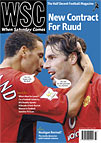 Though the extent of Leeds’ problems fluctuates from minute to minute, Duncan Young has tried to get a grip on it all
Though the extent of Leeds’ problems fluctuates from minute to minute, Duncan Young has tried to get a grip on it all
The conspicuous problem for Leeds is that not only do they not have the money to pay back their debts, they do not even have enough to maintain the obligations that must be met now. As recently revealed by chief executive Trevor Birch, a £60 milli0n loan is already secured against the stadium, a £3.5m debt is secured against the training ground and most of the key players are leased from a company in Jersey. Football finance expert Professor Tom Cannon of Checksure, an organisation that provides credit ratings on companies, describes this not unreasonably as “testing securitisation to its limits”. Even the status of the three valuable players that Leeds might actually own is in doubt, though selling even one would be tantamount to running up a white flag in the eyes of Leeds fans.
Birch, also acting chairman, finds himself in a multi-sided game of double dare. The creditors could seek to repossess Elland Road and Thorp Arch by applying for Leeds to be wound up, but Birch could forestall them by calling in administrators. Often a recovery deal is struck that allows the playing side to resume relatively unscathed. Press talk is of fire sales, but Professor Cannon cites examples including Leicester, who persuaded the tax man to accept 10p in the pound while staving off the “inevitable” loss of Muzzy Izzet. Overplay administration and the result could be liquidation, but that might be unthinkable even beyond Elland Road. The Premier League likes to emphasise collegiality when under scrutiny, but that defence and the confidence of clubs less visibly in peril could splinter if one of their own is abandoned, while recent talk of a rescue by “Yorkshire businessmen” demonstrates that being the only side in the region with Premiership status is a genuine selling point.
The fans, though, have had enough of brinkmanship. The players’ eventual postponement of 25 per cent of their wages may have come too late to repair the damage done by their initial hesitancy, though their money may be safer than most thanks to professional football’s “super creditor” rules. Basically you pay all your debts to football people first or you’re thrown out to start again at level ten of the pyramid for obtaining an unfair advantage. Major creditors, even the Inland Revenue following the Enterprises Act, find themselves less important than reserve goalkeepers. Lower-profile casualties such as non-playing staff and small creditors such as the ambulance service often fare worst of all.
Administration is effectively an admission of inability to pay debts. Ipswich and Bradford openly sought administration to avoid accusations of unlawfully trading while insolvent, penalties for which include unlimited liability on directors and custodial sentences. One disagreeable facet of administration is simply that outsiders come in and look at your books. Every time more has been revealed about the finances at Elland Road, it has not been pretty. With many companies in similar trouble the full extent of the damage is rarely known until all the records are laid bare. Heavy point penalties being introduced this summer nevertheless suggest any club seriously contemplating administration might be best served to complete their canoe-style Eskimo roll as soon as possible.
With or without administration, the debt is still there to be dealt with by somebody. “I believe even now that a new share issue is the only obvious way out. You’ve got to get all the current investors to agree to that, but at the current share price I can’t see a down side,” says Cannon, who believes this could net between £25m and £50m. He sees the club as still attractive in the long term if the debt can be cleared, as several suitors agree. First there was the Sheikh whose millions have yet to materialise, then there was former chief executive Allan Leighton and his unacceptably ring-fenced offer, before the lead was taken by a pair of bids from groups based in the region.
But share issues and takeovers need time, next season’s playing level is unknown and monthly payments mount up. Hence the stand-still agreement, the excruciating extensions and the desperate pleading with personnel who no longer serve the club but are still drawing money from it. Agonising progress is being made and so far neither Trevor Birch nor the major creditors have blinked, but it may count for little if losses keep accumulating on the field. The fans’ support seems to intensify even as the playing performances diminish. Their frustration is that the strongest part of the club is also the most helpless.
From WSC 205 March 2004. What was happening this month